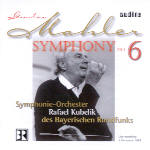This live Mahler Sixth sheds less light on Kubelik’s way with the music than previous releases from Audite, if only because its 1968 date places it in very close proximity to the studio recording from these same forces. Where this version differs from DG’s “offical” one, various factors clearly favor the commercial release. Kubelik still takes the music very fast, and the Bavarian Radio Orchestra players deserve credit for keeping up with him. But alongside Kubelik’s wonderful way with the first movement coda, ideally paced slow movement, and scorching second half of the finale, there are inevitably small lapses in ensemble, problems that were corrected in the studio (including the tendency to rush, as at the scherzo’s creepy second trio which here loses much of its character at such a tempo). In short, if you collect Kubelik’s Mahler and have been enjoying this series, you can certainly purchase this knowing that there’s nothing shameful or distressing going on–but there’s also nothing really new either. Good stereo sound, light on the bass but otherwise warm and transparent, makes for a pleasant (if hardly audiophile) listening experience.
































